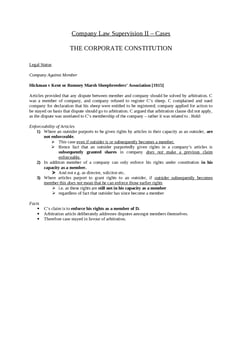Salomon v Salomon [1897] AC 22; [1896] UKHL 1
Judgement for the case Salomon v Salomon
Table Of Contents
KEY POINTS
A corporation is a separate legal entity distinct from its shareholders, even if a single individual or a closely related group of individuals owns the majority of the company's shares.
FACTS
In July 1892, Mr. Salomon, a prosperous boot and shoe manufacturer in Whitechapel, London, transformed his thriving business, "A. Salomon & Co.," into a limited company. This decision was influenced by family pressure, as his wife and grown-up children sought a share in the business.
The company was formed following all legal procedures under the Companies Act of 1862 and remained a private entity. Mr. Salomon, his wife, and children became initial subscribers and directors, and the company acquired Mr. Salomon's business for over £39,000, mostly paid to him in exchange for fully-paid shares and debentures, effectively clearing the business's debts.
However, the company faced financial difficulties due to industry setbacks, labor strikes, and unsellable stock, leading to Mr. Salomon's financial support, including debenture transfer to an investor named Mr. Broderip. When the company failed to meet its obligations, Mr. Broderip initiated legal action, triggering the company's liquidation and asset sale, which left unsecured creditors unpaid.
The liquidator counterclaimed against Mr. Salomon, arguing that the company functioned as an alias for him and should have the right to seek indemnity from him. While Mr. Broderip's claim was acknowledged, the judge suggested that the company might have a right to seek indemnity from Mr. Salomon based on the agency argument, leading to an order in line with this interpretation.
JUDGEMENT
The House of Lords allowed the appeal.
COMMENTARY
The significance of this case lies in its recognition of the fundamental separation between a company and its shareholders.
This separation is crucial in modern business and commerce, as it shields shareholders from personal liability for the company's debts and obligations.
For Further Study on Salomon v Salomon
Need instant answers? Our AI exam tutor is here to help.
Ask questions 🙋 Get answers 📔 It's simple 👁️👄👁️
Our AI is educated by the highest scoring students across all subjects and schools. Join hundreds of your peers today.
Get StartedSimilar Cases
Related Product Samples
These product samples contain the same concepts we cover in this case.
| Company Law | Separate Personality And Limited Personality Notes (23 pages) |

